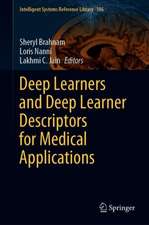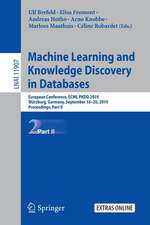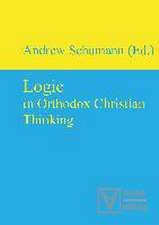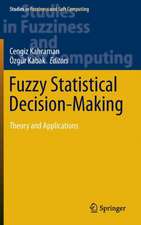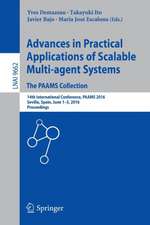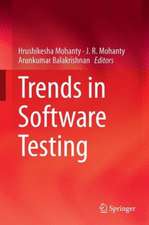Behaviourism in Studying Swarms: Logical Models of Sensing and Motoring: Emergence, Complexity and Computation, cartea 33
Autor Andrew Schumannen Limba Engleză Hardback – 6 iun 2018
| Toate formatele și edițiile | Preț | Express |
|---|---|---|
| Paperback (1) | 654.55 lei 6-8 săpt. | |
| Springer International Publishing – 14 feb 2019 | 654.55 lei 6-8 săpt. | |
| Hardback (1) | 661.14 lei 6-8 săpt. | |
| Springer International Publishing – 6 iun 2018 | 661.14 lei 6-8 săpt. |
Din seria Emergence, Complexity and Computation
- 8%
 Preț: 397.83 lei
Preț: 397.83 lei - 18%
 Preț: 1132.65 lei
Preț: 1132.65 lei - 18%
 Preț: 946.72 lei
Preț: 946.72 lei - 20%
 Preț: 651.75 lei
Preț: 651.75 lei - 20%
 Preț: 570.97 lei
Preț: 570.97 lei - 15%
 Preț: 653.33 lei
Preț: 653.33 lei - 15%
 Preț: 648.24 lei
Preț: 648.24 lei - 15%
 Preț: 651.19 lei
Preț: 651.19 lei - 20%
 Preț: 940.98 lei
Preț: 940.98 lei -
 Preț: 392.37 lei
Preț: 392.37 lei - 15%
 Preț: 647.59 lei
Preț: 647.59 lei - 15%
 Preț: 641.71 lei
Preț: 641.71 lei - 15%
 Preț: 645.28 lei
Preț: 645.28 lei - 15%
 Preț: 649.06 lei
Preț: 649.06 lei - 18%
 Preț: 1415.22 lei
Preț: 1415.22 lei - 20%
 Preț: 1304.44 lei
Preț: 1304.44 lei - 20%
 Preț: 1296.18 lei
Preț: 1296.18 lei - 20%
 Preț: 655.35 lei
Preț: 655.35 lei - 15%
 Preț: 648.56 lei
Preț: 648.56 lei - 18%
 Preț: 953.82 lei
Preț: 953.82 lei - 20%
 Preț: 657.02 lei
Preț: 657.02 lei - 18%
 Preț: 1117.03 lei
Preț: 1117.03 lei - 20%
 Preț: 992.26 lei
Preț: 992.26 lei - 15%
 Preț: 656.74 lei
Preț: 656.74 lei - 20%
 Preț: 649.60 lei
Preț: 649.60 lei - 15%
 Preț: 654.43 lei
Preț: 654.43 lei - 20%
 Preț: 645.47 lei
Preț: 645.47 lei - 20%
 Preț: 658.19 lei
Preț: 658.19 lei - 20%
 Preț: 644.15 lei
Preț: 644.15 lei - 18%
 Preț: 880.77 lei
Preț: 880.77 lei - 20%
 Preț: 1455.75 lei
Preț: 1455.75 lei - 20%
 Preț: 1158.26 lei
Preț: 1158.26 lei
Preț: 661.14 lei
Preț vechi: 826.42 lei
-20% Nou
Puncte Express: 992
Preț estimativ în valută:
126.51€ • 135.28$ • 105.48£
126.51€ • 135.28$ • 105.48£
Carte tipărită la comandă
Livrare economică 17 aprilie-01 mai
Preluare comenzi: 021 569.72.76
Specificații
ISBN-13: 9783319915418
ISBN-10: 331991541X
Pagini: 448
Ilustrații: XI, 468 p. 117 illus., 25 illus. in color.
Dimensiuni: 155 x 235 mm
Greutate: 0.85 kg
Ediția:1st ed. 2019
Editura: Springer International Publishing
Colecția Springer
Seria Emergence, Complexity and Computation
Locul publicării:Cham, Switzerland
ISBN-10: 331991541X
Pagini: 448
Ilustrații: XI, 468 p. 117 illus., 25 illus. in color.
Dimensiuni: 155 x 235 mm
Greutate: 0.85 kg
Ediția:1st ed. 2019
Editura: Springer International Publishing
Colecția Springer
Seria Emergence, Complexity and Computation
Locul publicării:Cham, Switzerland
Cuprins
Introduction.- Actin Filament Networks.- Unconventional Computers Designed on Swarm Behaviours.- Conventional and Unconventional Automata on Swarm Behaviours.- Non-Archimedean Valued Fuzzy and Probability Logics.- Individual-Collective Duality in Swarm Behaviours.- Syllogistic Systems of Swarm Propagation.- Context-Based Games of Swarms.
Textul de pe ultima copertă
This book presents fundamental theoretical results for designing object-oriented programming languages for controlling swarms. It studies the logics of swarm behaviours. According to behaviourism, all behaviours can be controlled or even managed by stimuli in the environment: attractants (motivational reinforcement) and repellents (motivational punishment). At the same time, there are two main stages in reactions to stimuli: sensing (perceiving signals) and motoring (appropriate direct reactions to signals). This book examines the strict limits of behaviourism the point of view of symbolic logic and algebraic mathematics: how far can animal behaviours be controlled by the topology of stimuli? On the one hand, we can try to design reversible logic gates in which the number of inputs is the same as the number of outputs. In the authors’ case, the behaviouristic stimuli are inputs in swarm computing and appropriate reactions at the motoring stage are its outputs. On the other hand, theproblem is that even at the sensing stage each unicellular organism can be regarded as a logic gate in which the number of outputs (means of perceiving signals) greatly exceeds the number of inputs (signals).
Caracteristici
Presents fundamental theoretical results for designing object-oriented programming languages for controlling swarms Studies the logics of swarm behaviours Proposes various logical tools for analyzing swarm reactions to attractants and repellents: non-classical logics, non-Archimedean probability theory, and bio-inspired game theory





